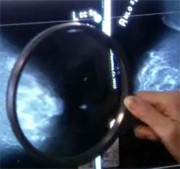
WEDNESDAY, July 27 (HealthDay News) — Greater breast density is associated with an increased risk of breast cancer and certain aggressive tumor traits, new research says.
In the study, published in the July 27 online edition of the Journal of the National Cancer Institute, researchers used mammography to compare breast density in 1,042 postmenopausal women with breast cancer and a control group of 1,794 postmenopausal women without breast cancer.
Breast density on mammograms is determined by the proportions of fat, connective tissue and epithelial tissue in the breast. Previous research has shown that women with higher amounts of epithelial and stromal tissue have more density and higher risk of breast cancer. But it hasn’t been clear whether breast density is associated with specific tumor characteristics and tumor type.
As expected, this new study found that breast cancer risk rose progressively with increasing breast density. The researchers also found that the link between density and breast cancer was stronger for larger tumors than for smaller tumors, for high-grade tumors compared to low-grade tumors, for estrogen receptor-negative tumors than for estrogen receptor-positive tumors, and for ductal carcinoma in situ (DCIS) tumors than for invasive tumors.
There was no association between breast density and other markers of tumor aggressiveness, including nodal involvement and HER2 status, the study authors noted in a journal news release.
“Our results suggest that breast density influences the risk of breast cancer subtypes by potentially different mechanisms,” wrote Rulla M. Tamimi, of Harvard Medical School and Brigham and Women’s Hospital in Boston, and colleagues.
“Further studies are warranted to explain underlying biological processes and elucidate the possible pathways from high breast density to the specific subtypes of breast carcinoma,” the authors added.
More information
The American Cancer Society has more about breast cancer.

